Find Help
More Items From Ergsy search
-
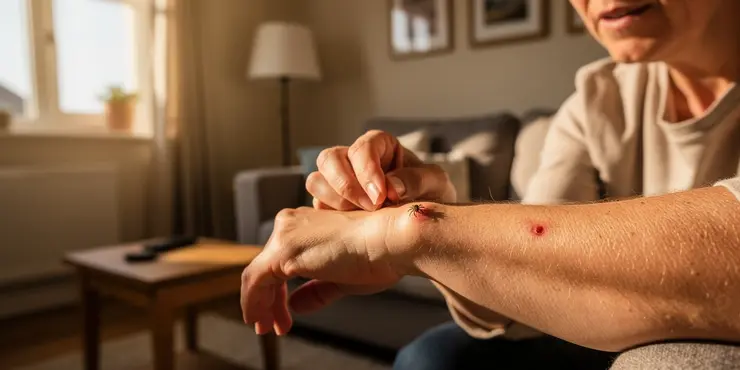
Tick Bites: Should you be worried?
Relevance: 100%
-
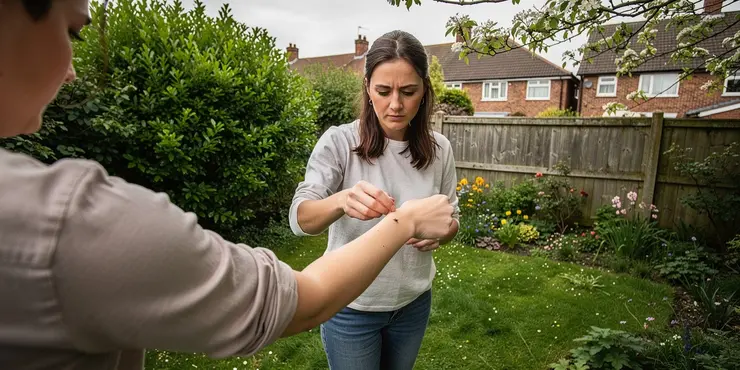
What should you do if you find a tick on your body?
Relevance: 70%
-
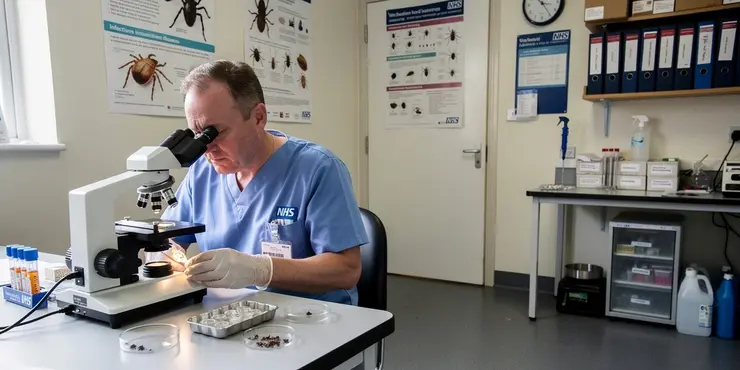
What kind of ticks carry Lyme disease?
Relevance: 69%
-

Self care - insect bites
Relevance: 55%
-
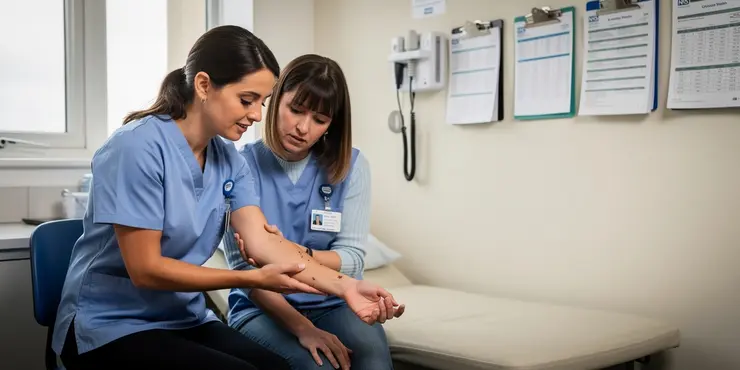
Think Pharmacy: Introduction for Bites and Stings
Relevance: 50%
-

Can HIV be transmitted through insect bites?
Relevance: 49%
-
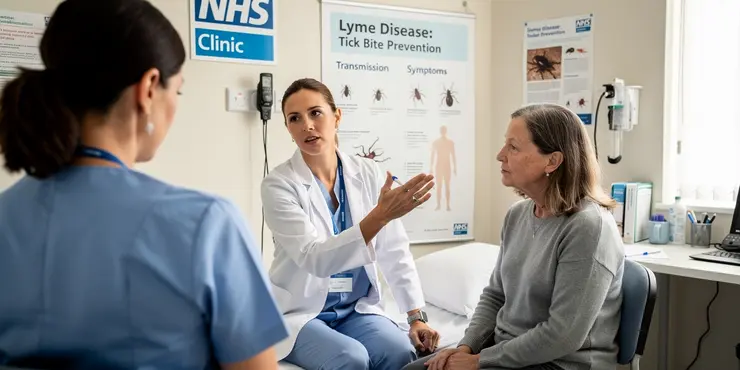
How is Lyme disease transmitted?
Relevance: 48%
-

Are mosquito bites in the UK harmful?
Relevance: 47%
-
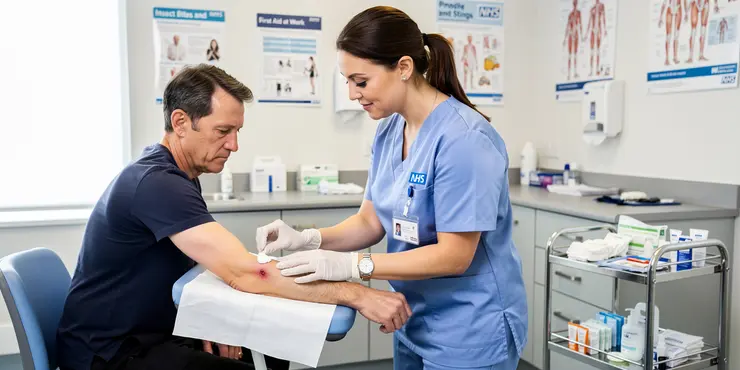
How to treat an insect bite or sting | NHS
Relevance: 47%
-

How do you prevent Lyme disease?
Relevance: 45%
-

Do all mosquitoes bite humans?
Relevance: 45%
-

Why are mosquito bites itchy?
Relevance: 45%
-
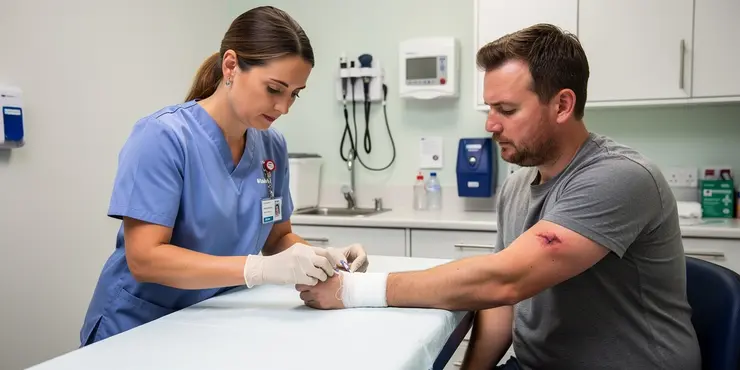
How to treat a dog bite
Relevance: 45%
-
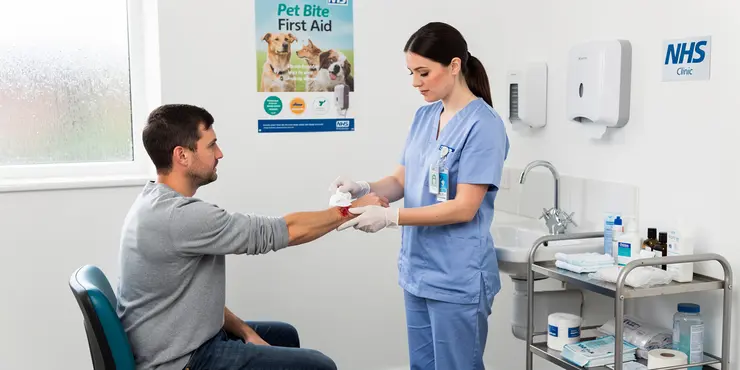
How to treat a cat bite
Relevance: 45%
-

How can I treat mosquito bites?
Relevance: 43%
-

Which spiders in the UK can bite humans?
Relevance: 43%
-

Is Lyme disease contagious between humans?
Relevance: 43%
-
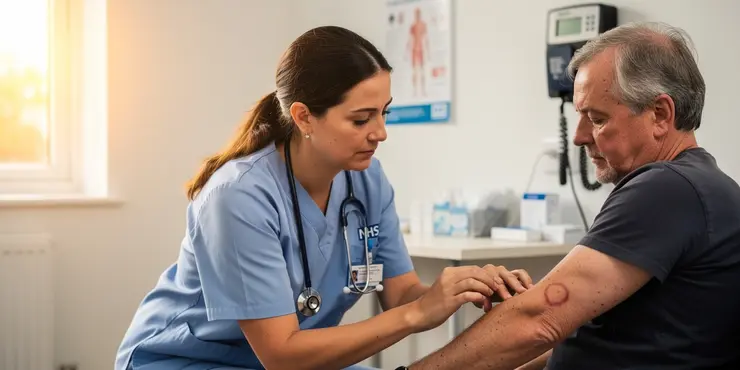
Lyme disease: What is it?
Relevance: 42%
-
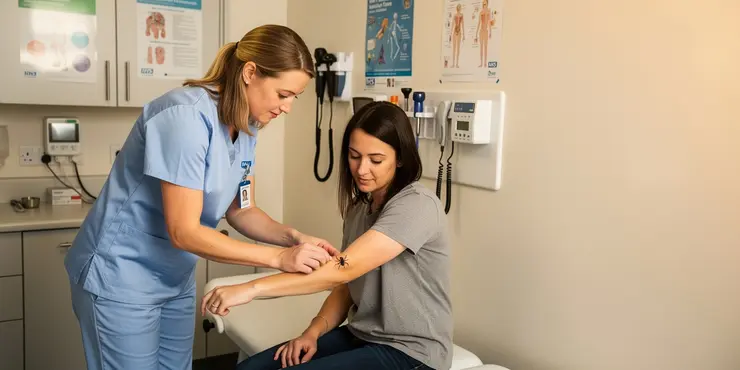
How long does a tick need to be attached to transmit Lyme disease?
Relevance: 42%
-

Is the bite from a false widow spider dangerous?
Relevance: 41%
-
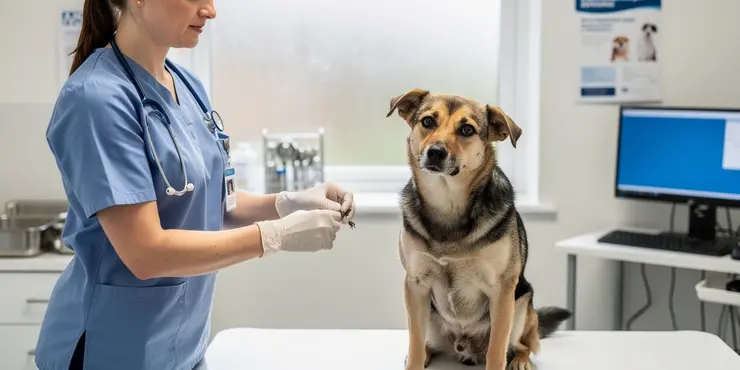
Can pets get Lyme disease?
Relevance: 41%
-

What is the first sign of Lyme disease?
Relevance: 41%
-
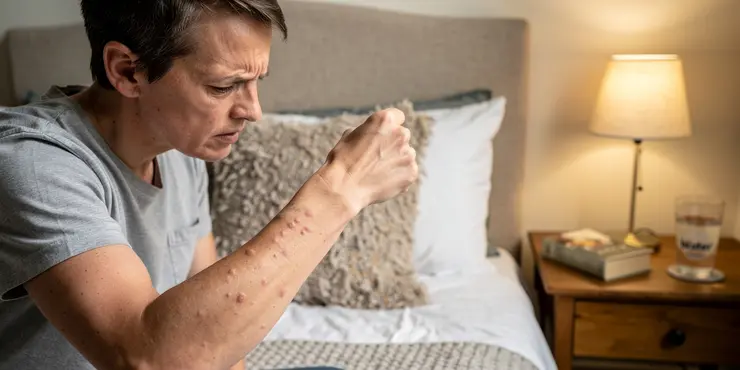
How can I tell if bites are from bed bugs?
Relevance: 41%
-
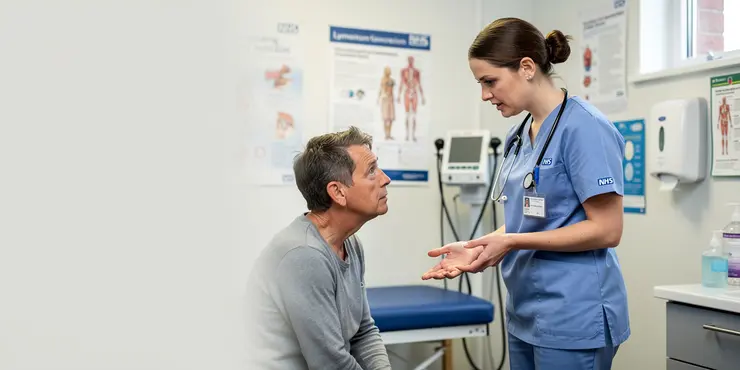
What is Lyme Disease?
Relevance: 39%
-

What are common symptoms of Lyme disease?
Relevance: 38%
-

How can I protect myself from mosquito bites in the UK?
Relevance: 37%
-
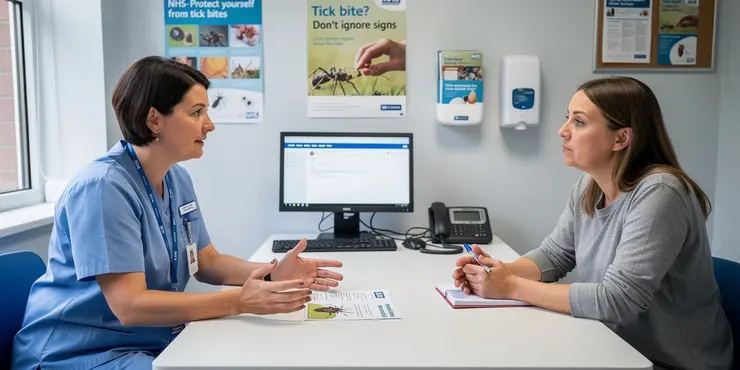
Can you get Lyme disease more than once?
Relevance: 37%
-
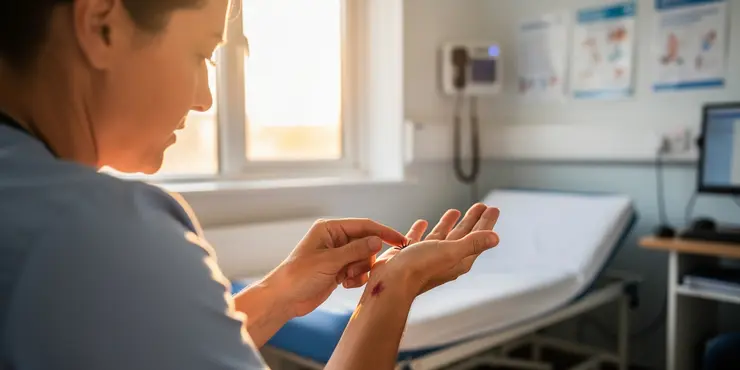
How common are spider bites in the UK?
Relevance: 34%
-
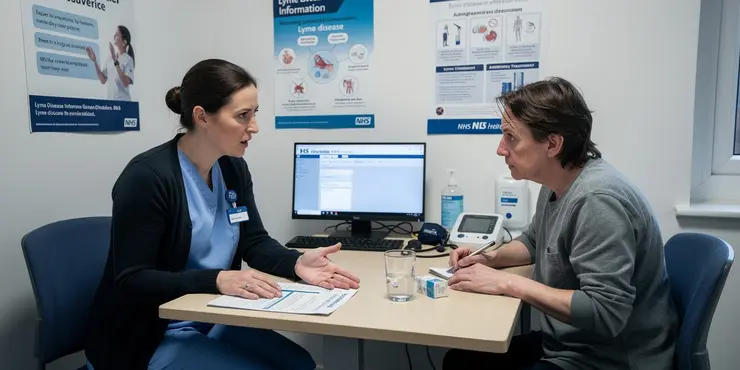
How effective are antibiotics in treating Lyme disease?
Relevance: 34%
-

Where is Lyme disease most commonly found?
Relevance: 32%
-

Can Lyme disease be treated?
Relevance: 27%
-
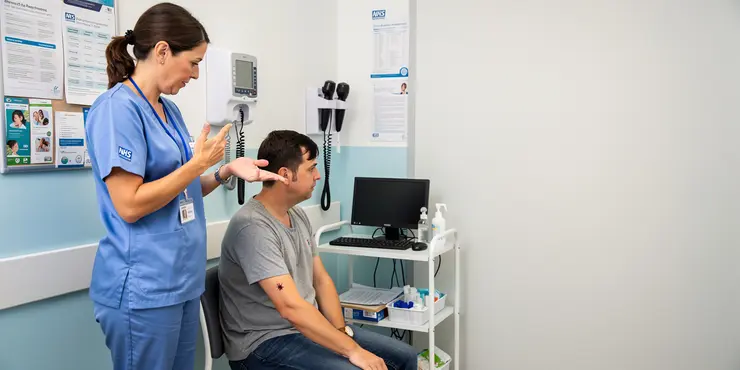
Do spiders in the UK carry diseases?
Relevance: 27%
-
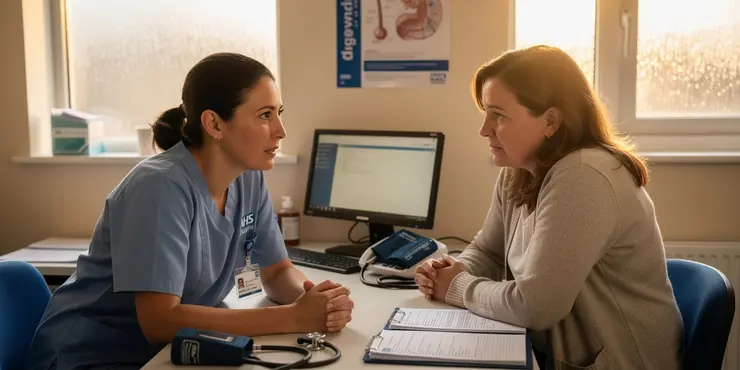
Is there a vaccine for Lyme disease?
Relevance: 24%
-

Do UK spiders pose a threat to pets?
Relevance: 23%
-

What should I do if I get bitten by a spider in the UK?
Relevance: 22%
-
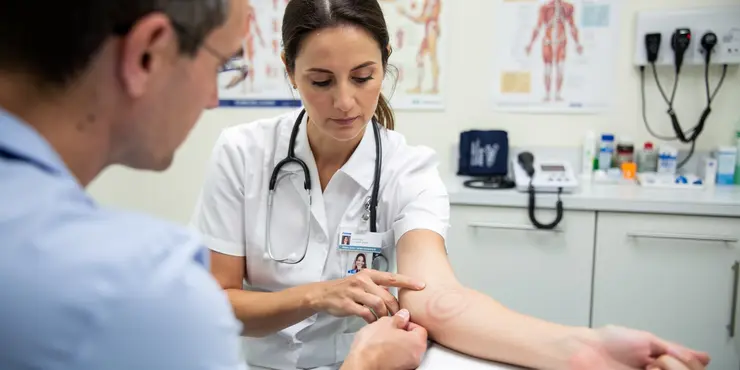
What happens if Lyme disease is left untreated?
Relevance: 20%
-

Can UK spiders cause allergic reactions?
Relevance: 20%
-

Are UK spiders venomous?
Relevance: 19%
-

Are there any poisonous spiders in the UK?
Relevance: 19%
-

How effective are mosquito repellents in the UK?
Relevance: 19%
Tick Bites: Should you be worried?
Understanding Tick Bites
Ticks are small, blood-sucking arachnids that are commonly found in woodland, grassland, and heathland areas in the United Kingdom. While a single tick bite is usually painless and often goes unnoticed, ticks can carry pathogens that cause diseases in humans and animals. One of the most notable diseases transmitted by ticks is Lyme disease.Identifying Tick Bites
Tick bites can generally be identified by a small red bump at the site of the bite. One key sign of a Lyme disease infection following a tick bite is the appearance of a "bullseye" rash, known as erythema migrans, which can develop 3-30 days after the bite. Symptoms might include fever, chills, headache, and fatigue.Should You Be Worried?
While not every tick bite leads to disease, it's crucial to be vigilant. The prevalence of Lyme disease has been increasing in the UK, particularly in areas like southern England and the Scottish Highlands. If left untreated, Lyme disease can lead to severe health issues affecting joints, heart, and nervous system. Prompt removal of a tick and timely medical treatment reduce the risk of severe outcomes.Preventing Tick Bites
Taking preventive measures can significantly reduce the risks associated with tick bites. When visiting tick-prone areas, wear long-sleeved shirts, long trousers, and tuck trousers into socks to minimize skin exposure. Use insect repellents that contain DEET or permethrin-treated clothing. Always perform a thorough tick check after spending time outdoors, especially in high-risk areas.What to Do If Bitten by a Tick?
If you find a tick on your body, remove it promptly with fine-tipped tweezers. Grasp the tick as close to the skin’s surface as possible and pull upwards with steady, even pressure. Avoid twisting or jerking the tick, which can cause mouth-parts to break off and remain in the skin. Clean the bite area with antiseptic. Monitor for any signs of rash or illness, and consult your GP if you experience symptoms suggestive of Lyme disease.Conclusion
Tick bites are relatively common in the UK, but with proper precautions, the risks can be minimized. Awareness and prompt action play vital roles in ensuring health and safety when dealing with ticks and potential tick-borne illnesses.Tick Bites: Should you be worried?
Understanding Tick Bites
Ticks are tiny creatures that suck blood. They live in woods, grasslands, and heaths in the UK. A tick bite doesn't usually hurt, and you might not notice it. However, ticks can spread diseases. One disease they can spread is called Lyme disease.Identifying Tick Bites
You can spot a tick bite by looking for a small red bump on the skin. A sign of Lyme disease from a tick bite is a "bullseye" rash. This rash can show up 3 to 30 days after the bite. Other symptoms can be fever, chills, headache, and feeling very tired.Should You Be Worried?
Not every tick bite causes a disease, but it's important to be careful. Lyme disease is becoming more common in places like southern England and the Scottish Highlands. If not treated, Lyme disease can cause serious problems with the joints, heart, and nerves. Removing a tick quickly and getting medical help can prevent serious issues.Preventing Tick Bites
You can do things to avoid tick bites. When you go to places with ticks, wear clothes that cover your skin, like long-sleeved shirts and long trousers. Tuck your trousers into your socks. Use bug spray that has DEET, or wear clothes treated with permethrin. Always check your body for ticks after being outside, especially in areas with lots of ticks.What to Do If Bitten by a Tick?
If a tick bites you, take it off quickly with tweezers. Grab the tick close to your skin and pull up slowly and steadily. Do not twist or jerk the tick, as this can leave parts of the tick in your skin. Clean the bite area with antiseptic. Watch for any rash or signs of illness, and see your doctor if you start feeling symptoms of Lyme disease.Conclusion
Tick bites happen often in the UK, but you can reduce the risk. Being aware and acting quickly are key steps to staying healthy and safe from ticks and the diseases they may carry.Frequently Asked Questions
What are the common symptoms of a tick bite?
Common symptoms of a tick bite include a red spot or rash, swelling, itchiness, and in some cases, the tick may still be attached to the skin.
Should I be worried if I find a tick on my skin?
It's important to remove the tick promptly and properly. While many tick bites are harmless, some can transmit diseases such as Lyme disease, so monitoring for symptoms is crucial.
How can I safely remove a tick?
Use fine-tipped tweezers to grasp the tick as close to the skin's surface as possible. Pull upward with steady, even pressure. Avoid twisting or jerking the tick.
What should I do after removing a tick?
Clean the bite area and your hands with rubbing alcohol, iodine scrub, or soap and water. Preserve the tick in a sealed container in case of future symptoms.
When should I see a doctor after a tick bite?
You should see a doctor if you develop symptoms such as a rash, fever, or flu-like symptoms within several weeks after the bite.
What is Lyme disease?
Lyme disease is an infection caused by bacteria carried by some ticks. It can cause symptoms such as fever, headache, fatigue, and a characteristic skin rash called erythema migrans.
Can Lyme disease be treated?
Yes, Lyme disease can be effectively treated with antibiotics, especially if caught early. Timely treatment can prevent further complications.
How common is Lyme disease in the UK?
Although Lyme disease is relatively rare in the UK, cases have been increasing. It's more prevalent in certain areas, such as southern England and the Scottish Highlands.
What are the long-term effects of untreated Lyme disease?
Untreated Lyme disease can lead to more serious health problems, including joint pain, neurological issues, and heart problems.
Are there other diseases ticks can transmit?
Yes, ticks can also transmit diseases such as anaplasmosis, babesiosis, and tick-borne encephalitis, though these are less common in the UK.
How can I prevent tick bites?
Wear long sleeves and trousers, use insect repellent, stick to paths, and avoid brushing against vegetation. Check your skin and clothing for ticks after being outdoors.
Can ticks be found all year round?
Ticks are most active between spring and autumn, but they can be found all year round in areas with mild weather.
Do pets need protection from ticks?
Yes, pets can get tick-borne diseases. Regularly check them for ticks and use veterinary-recommended tick prevention treatments.
Can tick bites be painful?
Many people do not feel tick bites because ticks secrete a numbing substance as they bite. However, the area may become itchy or swollen afterwards.
What should I do if I develop a rash after a tick bite?
If you develop a rash, particularly a bull's-eye pattern, or other symptoms like fever or fatigue, see a doctor immediately as these may be signs of Lyme disease.
What happens if a tick bites you?
If a tick bites you, you might notice these things:
- A small red spot where the tick bit you.
- The spot might be itchy or feel sore.
- You might have a fever or feel tired.
- Sometimes you can get a rash.
If you feel unwell or see any of these signs, tell an adult. They can help you. You might need to see a doctor.
To help you understand, you can:
- Ask someone to explain it to you.
- Look at pictures to learn more.
- Use a reading tool that reads aloud.
When a tick bites you, you might see a red spot or rash on your skin. Your skin could also swell up and feel itchy. Sometimes, the tick might still be sticking to your skin.
Is it bad if I find a tick on my skin?
If you find a tick on your skin, don’t worry too much. Here’s what you can do:
- Stay calm and don’t touch the tick too much.
- Use a special tool like tweezers to take the tick off.
- Wash the place where the tick was with soap and water.
- If you feel sick or the skin gets red, tell an adult or doctor.
Some tools can help you understand more, like a picture book about ticks or asking a helper to read with you.
It is important to take off the tick quickly and in the right way. Most tick bites do not hurt you, but some can carry bad germs like Lyme disease. Watch for signs of feeling ill.
How do I take off a tick safely?
Use tweezers with a thin end to grab the tick close to your skin. Pull the tick up slowly without twisting or yanking it.
What should I do after taking off a tick?
1. Clean the area: Wash the skin where the tick was with soap and water.
2. Check yourself: Look for other ticks on your body.
3. Watch your skin: If you see a rash or feel sick, tell an adult or a doctor.
4. Write it down: Note the date you took off the tick. It can help if you feel sick later.
5. Use tools: You can ask an adult to help you. Use tick-removing tools or take a photo of the tick to show the doctor.
Wash the bite and your hands with rubbing alcohol, iodine scrub, or soap and water. Keep the tick in a closed container in case you feel sick later.
When should I go to the doctor after a tick bite?
If a tick bites you, you might need to see a doctor. Here’s when:
- If you feel sick, get a fever, or a rash.
- If the tick stays stuck or you can’t remove it.
- If the bite area looks very red or swollen.
Ask a grown-up to check if you need help. A magnifying glass can help you see the tick better.
Go to the doctor if you get sick after a tick bite. Signs to watch for are a rash, fever, or feeling like you have the flu. Look out for these signs for a few weeks after the bite.
What is Lyme disease?
Lyme disease is an illness you can get from a tick bite.
Ticks are tiny bugs that live in the grass.
If you get bitten by an infected tick, you might feel sick.
It is important to see a doctor if you think you have Lyme disease.
Doctors can help you feel better with medicine.
Tools to help:
- Ask a friend or family member to help you read about Lyme disease.
- Use picture books or videos to learn more.
Lyme disease is an illness. Tiny bugs called ticks can give you this illness. They have germs that cause it. If you have Lyme disease, you might feel sick, tired, and have a headache. You might also get a special kind of red rash on your skin. This rash is called erythema migrans.
Can Lyme disease be treated?
Yes, Lyme disease can be treated.
Doctors use special medicine to help people get better. This medicine is called antibiotics.
If you think you have Lyme disease, it is important to see a doctor quickly.
Using pictures or asking someone you trust to help explain can make understanding easier.
Yes, doctors can treat Lyme disease with special medicine called antibiotics. It works best if you start early. Getting the medicine quickly helps stop more problems.
How often do people in the UK get Lyme disease?
Lyme disease is an illness you can get from ticks. These are very small bugs. It is not very common in the UK, but some people do get it.
Here are some tips to help:
- Use a calendar to know when ticks are most active.
- Ask a friend or family member to help you read more about ticks.
- Use a magnifying glass to spot ticks if you go walking in grassy areas.
Lyme disease does not happen often in the UK, but more people are getting it now. It is found more in places like southern England and the Scottish Highlands.
What happens if Lyme disease is not treated for a long time?
Lyme disease is an illness you can get from a tick bite. If it is not treated, it can cause problems for a long time.
Here are some things that can happen:
- Joints can hurt or swell. This is called arthritis.
- It can make you feel very tired and weak.
- Your heart might not work as well. This can make you feel dizzy.
- It can also cause problems with memory and thinking.
If you think you have Lyme disease, it is important to see a doctor. They can help make it better.
Here are some tools that can help you understand and remember:
- Use simple charts or drawings to show what happens.
- Ask someone to explain it to you using simple words.
- Write down what your doctor says so you can read it later.
If Lyme disease is not treated, it can cause bigger health problems. These might include sore joints, problems with the brain, and heart issues.
Can ticks spread other sicknesses?
Yes, ticks can spread other sicknesses too.
Here are some tips and tools to help you:
- Ask someone to read with you.
- Use simple words or drawings to understand better.
- Take your time when reading words.
Yes, ticks can spread other diseases like anaplasmosis, babesiosis, and tick-borne encephalitis. But these diseases are not as common in the UK.
How can I stop tick bites?
Here are some tips to help you:
- Wear the right clothes: Put on long sleeves and pants. Light colors help you see ticks better.
- Use bug spray: Use sprays that keep ticks away. Read the label to make sure it is for ticks.
- Stay on paths: When you walk outside, stay in the middle of paths and avoid tall grass.
- Check your body: After being outside, check your skin for ticks. Look under arms, behind ears, and in hair.
- Take a shower: Shower after coming indoors to wash off ticks.
Use these tips to keep ticks away and stay safe outdoors!
Wear long shirts and long pants. Use bug spray. Stay on the paths. Try not to touch plants. Look at your skin and clothes for ticks after you go outside.
Are ticks around all year?
Yes, you can find ticks all year. But, there are more ticks in spring and summer.
Things that can help:
- Wear long clothes to cover your skin.
- Use bug spray to keep ticks away.
- Check your body for ticks after being outside.
Ticks are little bugs. They are most active from spring to autumn. But you can find them all year in places where the weather is not too cold.
Do pets need help with ticks?
Pets can get itchy bugs called ticks. Ticks bite pets and make them sick.
Do these things to help your pet:
- Check your pet’s fur for ticks often.
- Use tick spray or tick collar to keep ticks away.
- Ask the vet for advice about ticks.
Yes, pets can get sick from ticks. Check your pet for ticks often. You can also use special medicine from the vet to keep ticks away.
Do tick bites hurt?
A tick bite might hurt a little. But sometimes, you might not feel it.
If you are worried or have questions, ask someone for help. You can also use a magnifying glass to check your skin if you think you have a tick bite.
When a tick bites, you might not feel it. This is because ticks use a special thing that stops you from feeling pain. But later, the spot might get itchy or swell up.
What to Do if You Get a Skin Rash After a Tick Bite:
If you get a rash that looks like a bull's-eye or feel sick with a fever or very tired, go to the doctor right away. These could be signs of a sickness called Lyme disease.
To help understand better, you can:
- Ask someone to read with you.
- Use a reading app to hear the words out loud.
- Look at pictures of a bull’s-eye rash online.
Useful Links
This website offers general information and is not a substitute for professional advice.
Always seek guidance from qualified professionals.
If you have any medical concerns or need urgent help, contact a healthcare professional or emergency services immediately.
Some of this content was generated with AI assistance. We’ve done our best to keep it accurate, helpful, and human-friendly.
- Ergsy carfully checks the information in the videos we provide here.
- Videos shown by Youtube after a video has completed, have NOT been reviewed by ERGSY.
- To view, click the arrow in centre of video.
- Most of the videos you find here will have subtitles and/or closed captions available.
- You may need to turn these on, and choose your preferred language.
- Go to the video you'd like to watch.
- If closed captions (CC) are available, settings will be visible on the bottom right of the video player.
- To turn on Captions, click settings .
- To turn off Captions, click settings again.
More Items From Ergsy search
-

Tick Bites: Should you be worried?
Relevance: 100%
-

What should you do if you find a tick on your body?
Relevance: 70%
-

What kind of ticks carry Lyme disease?
Relevance: 69%
-

Self care - insect bites
Relevance: 55%
-

Think Pharmacy: Introduction for Bites and Stings
Relevance: 50%
-

Can HIV be transmitted through insect bites?
Relevance: 49%
-

How is Lyme disease transmitted?
Relevance: 48%
-

Are mosquito bites in the UK harmful?
Relevance: 47%
-

How to treat an insect bite or sting | NHS
Relevance: 47%
-

How do you prevent Lyme disease?
Relevance: 45%
-

Do all mosquitoes bite humans?
Relevance: 45%
-

Why are mosquito bites itchy?
Relevance: 45%
-

How to treat a dog bite
Relevance: 45%
-

How to treat a cat bite
Relevance: 45%
-

How can I treat mosquito bites?
Relevance: 43%
-

Which spiders in the UK can bite humans?
Relevance: 43%
-

Is Lyme disease contagious between humans?
Relevance: 43%
-

Lyme disease: What is it?
Relevance: 42%
-

How long does a tick need to be attached to transmit Lyme disease?
Relevance: 42%
-

Is the bite from a false widow spider dangerous?
Relevance: 41%
-

Can pets get Lyme disease?
Relevance: 41%
-

What is the first sign of Lyme disease?
Relevance: 41%
-

How can I tell if bites are from bed bugs?
Relevance: 41%
-

What is Lyme Disease?
Relevance: 39%
-

What are common symptoms of Lyme disease?
Relevance: 38%
-

How can I protect myself from mosquito bites in the UK?
Relevance: 37%
-

Can you get Lyme disease more than once?
Relevance: 37%
-

How common are spider bites in the UK?
Relevance: 34%
-

How effective are antibiotics in treating Lyme disease?
Relevance: 34%
-

Where is Lyme disease most commonly found?
Relevance: 32%
-

Can Lyme disease be treated?
Relevance: 27%
-

Do spiders in the UK carry diseases?
Relevance: 27%
-

Is there a vaccine for Lyme disease?
Relevance: 24%
-

Do UK spiders pose a threat to pets?
Relevance: 23%
-

What should I do if I get bitten by a spider in the UK?
Relevance: 22%
-

What happens if Lyme disease is left untreated?
Relevance: 20%
-

Can UK spiders cause allergic reactions?
Relevance: 20%
-

Are UK spiders venomous?
Relevance: 19%
-

Are there any poisonous spiders in the UK?
Relevance: 19%
-

How effective are mosquito repellents in the UK?
Relevance: 19%


